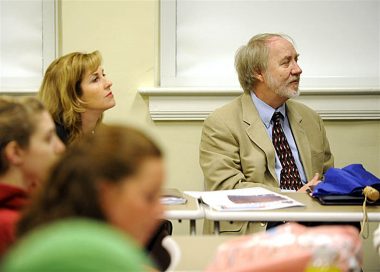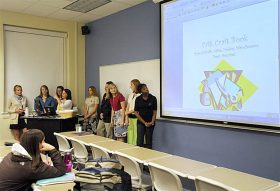Students in a Childhood and Human Services course worked this spring semester with two local nonprofits to create programs and activities that will carry on long after they leave the classroom.
Family Abuse Services, which assists women and children who are victims of domestic violence, and CrossRoads Sexual Assault Response and Resource Center partnered with associate professor Judy Esposito to provide a “learning lab” of sorts for students whose work would assist the organizations for years to come.
And twice this week, the class – divided into groups to assist the agencies – presented their suggestions to leaders of both Alamance County nonprofits.
“While working at CrossRoads, my group noticed what a struggle it is for advocates to continuously update their techniques for working with children,” said Elon senior Catherine Parsons, whose group shared their project with CrossRoads representatives on May 4. “Our goal for our semester long project was to create a book of games for the advocates to use as a supplement in their sessions.
“Games were created to improve self-esteem, teach personal safety, and allow children to identify their feelings,” she added. “We hope they’ll aid victims of sexual abuse in the healing process.”
A student who presented May 6 to the executive director of Family Abuse Services said her group discovered a need for child and family-centered activities at the shelter.

“Both volunteers and parents struggled to keep the children entertained, and by creating the activities book, ABC’s of FAS, we were able to give options as to what they can do,” said junior Laura Edelman. “We knew there was a lack of funding, and we also didn’t want these activities to require funding, so we worked on creating activities that were cost-free. Some examples of this include: dance, exercise, labyrinth, nature walk, jungle gym, outdoor activities, hide and seek, and reading.”
Nonprofit administrators said they appreciate the insight students bring to their agencies. And with limited funding, they said, have a sustainable project – one that requires little or no continued funding once the project is implemented – brings added value to the partnership.
“It was good to have students who have fresh eyes on things,” said Sam Parker, executive director of Family Abuse Services, which houses domestic violence victims, including children, for up to a few months. “They challenged staff to take another look at what they’d been seeing.”
The partnerships were a learning experience for both groups.
“The biggest lessons I learned were the way an issue, such as sexual assault, affects not only the victim, but those around the victim,” said sophomore Emily Wise. “Being part of a service-learning course at CrossRoads definitely opened my eyes to a whole new sector of nonprofit work.”



